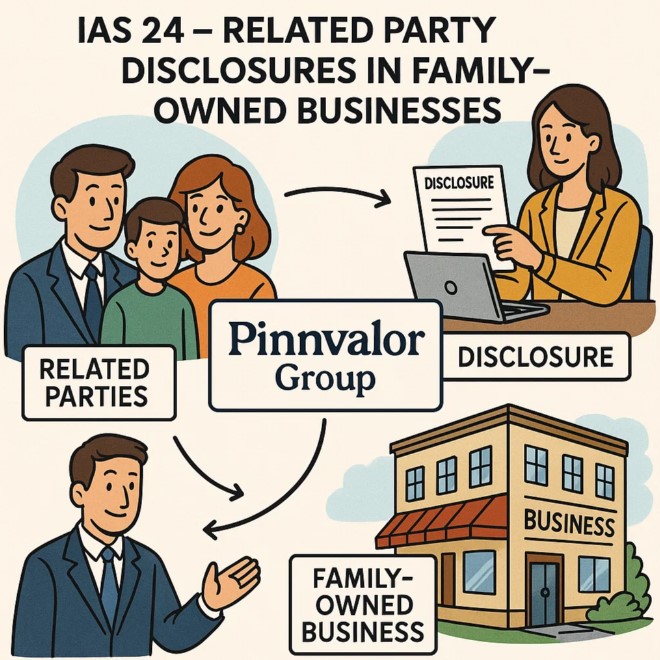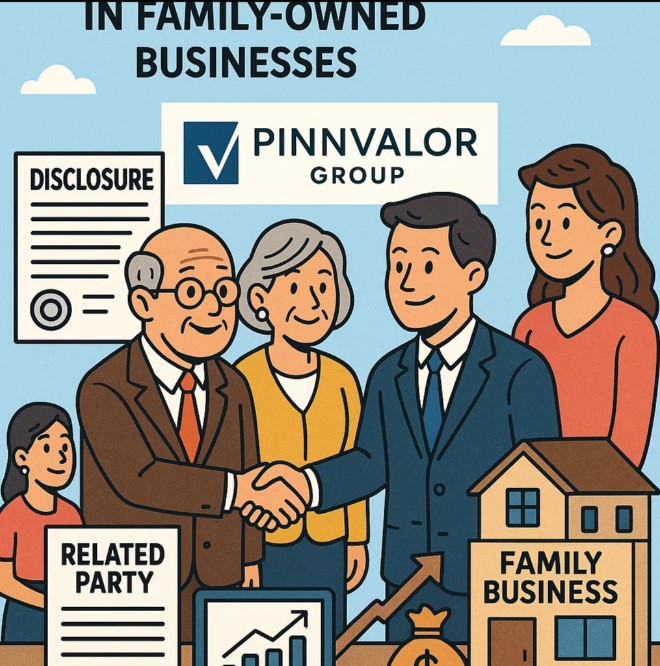
IAS 24 – Related Party Disclosures in Family-Owned Businesses
Family-owned businesses form the backbone of many economies worldwide. They often combine strong entrepreneurial spirit with deep-rooted trust among family members. However, these very characteristics can also blur the lines between personal relationships and business operations. When family ties influence transactions, the potential for related party transactions (RPTs) increases significantly.
To address transparency and safeguard the interests of investors, lenders, and regulators, IAS 24 – Related Party Disclosures requires companies to disclose relationships and transactions with related parties. In family-owned businesses, this standard plays a particularly crucial role.
Can family trust and business transparency truly coexist without proper related party disclosures under IAS 24?
Disclosing related party relationships isn’t about avoiding family involvement— it’s about ensuring fairness and clarity in how these relationships shape business results.
What Does IAS 24 Cover?
IAS 24 defines and prescribes disclosure requirements for related party relationships, transactions, and outstanding balances. Its primary objective is to ensure that the financial statements contain the necessary information to draw attention to the possibility that the financial position and performance may have been affected by related party transactions.
Key areas covered:
- Identification of related parties
- Disclosure of transactions with related parties
- Disclosure of outstanding balances with related parties
- Compensation of key management personnel (KMP)
Who Are Considered Related Parties in Family-Owned Businesses?
In a family-owned context, related parties are far more common than in widely held corporations. Under IAS 24, related parties include:
- Family Members – Spouse, children, parents, siblings of the owner or key management, and family members who may influence or be influenced by the business.
- Entities Controlled or Jointly Controlled by Family – Subsidiaries, partnerships, or trusts managed by family members.
- Key Management Personnel (KMP) – Relatives of directors or executives making decisions.
- Shareholders with Significant Influence – Family members holding controlling stakes.
Common Related Party Transactions in Family-Owned Businesses
Some examples often found in practice include:
- Loans or advances given to family members without proper terms.
- Leasing of property owned by family to the business at favorable rates.
- Purchase of goods or services from family-run entities.
- Employment of family members without transparent remuneration policies.
- Guarantees or financial support extended between related entities.
Disclosure Requirements under IAS 24
IAS 24 mandates disclosure of:
- Relationships – Even if there are no transactions, the relationship must be disclosed (e.g., parent-subsidiary relationship).
- Nature of Transactions – Clear description (e.g., sale of goods, lease of property, loans).
- Outstanding Balances – Amounts receivable/payable, provisions for doubtful debts.
- Terms & Conditions – Pricing policies, interest rates, security provided, settlement terms.
- KMP Compensation – Breakdown of short-term, post-employment, share-based, and other benefits.

Why IAS 24 Is Crucial for Family-Owned Businesses
- Transparency – Prevents misuse of resources for personal gain.
- Investor Confidence – Outside investors gain trust when disclosures are robust.
- Regulatory Compliance – Avoids penalties and reputational damage.
- Conflict Resolution – Clear disclosures reduce disputes among family stakeholders.
- Governance – Strengthens internal control and corporate governance.
Challenges in Implementation
Family-owned businesses often face hurdles such as:
- Reluctance to disclose sensitive intra-family dealings.
- Informal nature of many family transactions.
- Lack of separation between ownership and management roles.
- Perception that disclosures may invite scrutiny from tax authorities or regulators.
Best Practices for Family-Owned Businesses
To comply effectively with IAS 24, businesses should adopt:
- Clear policies for identifying and approving RPTs.
- Independent directors or advisors to review transactions.
- Formal contracts for all family-related dealings.
- Regular training for accounting staff on IAS 24 requirements.
- Audit committee oversight for monitoring disclosures.
Conclusion
Family-owned businesses thrive on trust, but financial reporting demands more than trust—it requires transparency, accountability, and compliance. IAS 24 ensures that all stakeholders, including minority shareholders, investors, and regulators, are aware of related party dealings that may influence the company’s performance.
In essence, disclosing related party relationships isn’t about avoiding family involvement—it’s about ensuring fairness and clarity in how these relationships impact business results.
